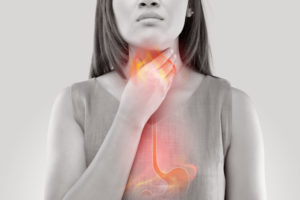Have you ever had heartburn? We all have, but for most of us, it creeps in after eating something spicy, then after a few antacids, it goes away. For others, it is persistent, on-going, and an indication of a bigger problem.
When should you see a doctor? If you have frequent heartburn, more that twice a week. The Mayo Clinic lists the symptoms of heartburn, “A burning pain in the chest that usually occurs after eating and may occur at night, pain that worsens when lying down or bending over, and a bitter or acidic taste in the mouth.”
Recurrent heartburn is not normal, early treatment can prevent it from progressing into GERD, Barrett’s esophaguses, Dysplasia, and even cancer
Heartburn can become a very serious issue, make an appointment with your doctor if:
 Heartburn occurs more than twice a week
Heartburn occurs more than twice a week
Symptoms persist despite the use of over-the-counter medications
You have difficulty swallowing
You have persistent nausea or vomiting
You have weight loss because of poor appetite or difficulty eating
GERD
The burning sensation associated with heartburn is caused by stomach fluid re-entering the esophagus. Depending on the severity, it can be felt all the way up to the throat. The most common cause of heartburn is GERD, Gastroesophageal reflux disease. Instead of over the counter antacids, it should be treated by a specialized doctor because it is often associated with other diseases. Such as, reflux laryngitis, scleroderma, mixed connective tissue disease, peptic ulcer, esophageal cancer and asthma.
If you suffer from GERD, you may want to avoid certain foods and drinks
Spicy foods and tomato based products
Chocolate and coffee
Alcohol and excessively fatty foods
Citrus based juices
 Barrett’s Esophagus
Barrett’s Esophagus
Barrett’s esophagus is a condition where the lining of the esophagus becomes damaged by acid reflux. The lower esophageal sphincter, located between the stomach and esophagus, can begin to fail. When this happens, GERD can happen, chemicals and acid damage the esophagus. This can cause the cells lining to change in the lower esophagus, causing Barrett’s esophagus.
The Mayo Clinic warns, “Barrett’s esophagus is associated with an increased risk of developing esophageal cancer. Although the risk of developing esophageal cancer is small, it’s important to have regular checkups with careful imaging and extensive biopsies of the esophagus to check for precancerous cells (dysplasia). If precancerous cells are discovered, they can be treated to prevent esophageal cancer.”
Dysplasia
If you do have Barrett’s esophagus, you may want to get tested for dysplasia. A precancerous condition, which can be removed before progressing into cancer. This is done with regular endoscopies and biopsies.
Esophageal Cancer
Untreated heartburn can progress into GERD, then to Barrett’s esophagus, which makes your risk for Dysplasia, precancerous cells, and esophageal cancer, which if discovered early is treatable. “People with Barrett’s esophagus have an increased risk of esophageal cancer. The risk is small, even in people who have precancerous changes in their esophagus cells.” Mayo Clinic.
If your heartburn is frequent and interferes with your daily life, it may be a symptom of a more serious medical condition that requires immediate attention. With the help of a gastroenterologist or dietician, you may be able to cut out heartburn with a few simple lifestyle changes.
Preventative screening and testing help detect diseases and conditions in their early and most treatable stages. For more information or to make an appointment, contact Gastroenterology Consultants of Central Florida.
 October is Breast Cancer Awareness Month
October is Breast Cancer Awareness Month
In honor of Breast Cancer Awareness Month, the family at Gastroenterology Consultants of Central Florida encourages everyone to join us in learning more about breast cancer and support those who are suffering with the disease.
Though we have made great progress in early detection, cancer treatment and finding a cure, we still have a long way to go.
